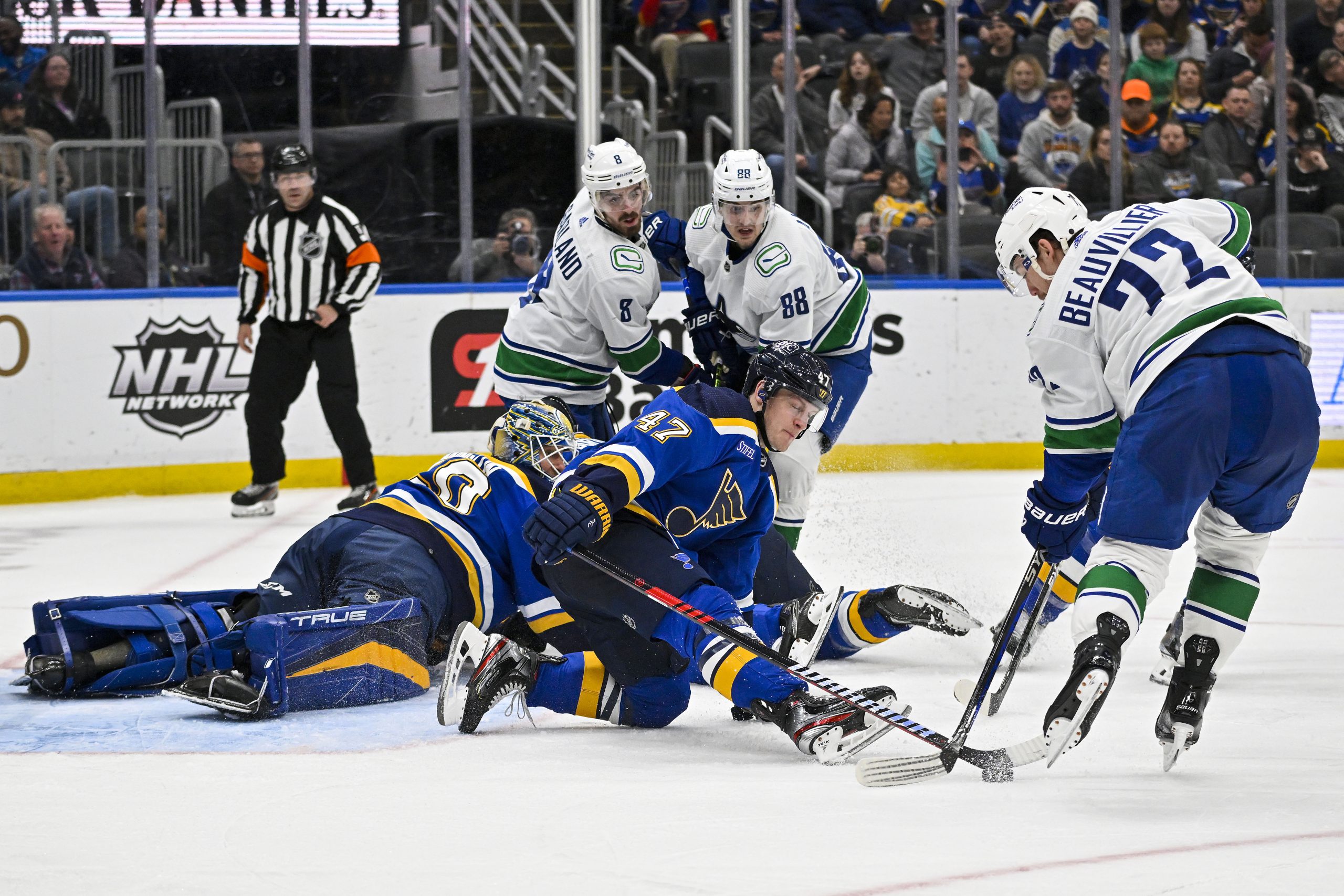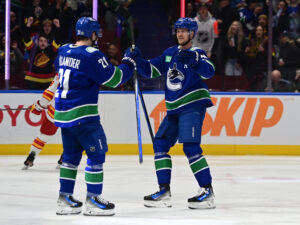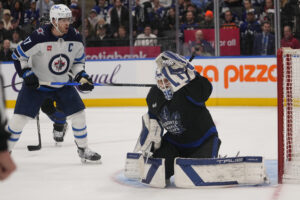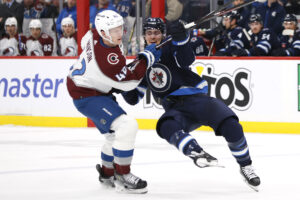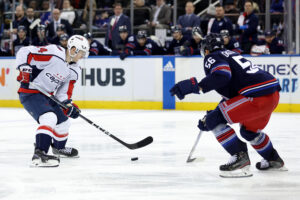Of all the Vancouver Canucks’ issues, “too much of a good thing” isn’t one that leaps to mind. But an excess on the Vancouver Canucks wingers is the most likely way to help resolve some of the problems that are actually problems.
Too Much and Not Enough
The Vancouver Canucks wingers is a position of strength. Dealing from strength is the principal thought behind the “best player available” draft strategy. Even if your team has specific needs – say, a right-side defenceman – if the best player happens to be a winger, draft them. They can then later be traded for your RHD.
It’s a great idea, so long as the players your team drafts develop well and they actually become a strength. And that the value of the player you need doesn’t far outstrip the ones you have in surplus. But bringing back players isn’t the only reason for a trade.
If the Canucks aren’t looking to bring back players, they can get deals done. Exchanging certainty – an NHL player – for potential – draft picks or prospects – is a common occurrence. Cap space also has value, and that’s what we’ll consider as the primary return for these potential trade chips.
Anthony Beauvillier
Anthony Beauvillier hitting 40 points in a season for the first time in his career eased some pain from the Bo Horvat trade. It took three games to get his first point, but when he broke that goose egg he rolled. Of all the Vancouver Canucks wingers, he has been a bright spot.
Eleven points in the next nine games didn’t stop the Canucks slide, but fans could feel better about the return. He couldn’t keep that pace up, getting just another nine points in the season’s last 22 games.
Beauvillier had the advantage of stepping into Ilya Mikheyev‘s spot beside Elias Pettersson and Andrei Kuzmenko. Matching his early scoring would have made him a lock as their third. The trick here is that everyone worked well with Pettersson and Kuzmenko.
That puts Beauvillier’s price tag of $4.15 million in question. He has good speed – which Vancouver’s wings lack – and has some versatility. It’s hard to argue that he adds more than that, though.
He’s played centre before, but not since he broke into the league. If a team needs to complete a third line with some speed and scoring, they could do worse than Beauvillier. The problem is that describes Vancouver quite well.
Conor Garland
What to do with Conor Garland. What, what, what to do. Of all the Vancouver Canucks wingers, it circles around him. It is a question that haunts in part because we need to know what the team is doing and in part because of what he can do.
Let’s start here: Conor Garland is a very good player. He’s a blast to watch every time he’s on the ice. He’s got a motor that doesn’t quit and at his size, he’s a perpetual underdog story. If the idea is to keep players who work hard, he’s the next captain.
And after Horvat was traded his most common linemates were Dakota Joshua and Nils Aman. Even in a bottom-six role for half the season, Garland scored 17 goals and 46 points. He can drive a line, especially when he has the puck.
That is the issue. The Canucks top two centres – Pettersson and J.T. Miller – are at their best when they carry the puck. Miller worked with Garland fine on opposite wings but hasn’t found the same chemistry with him at centre.
Garland’s contract – just under $5 million for three more seasons – is fine. Not exceptional and not crippling, but not the kind of cap hit the Canucks can – or should – carry in the bottom-six. Certainly not until they are actually competing, anyway.
Brock Boeser
It’s always a bit hard to bring up Brock Boeser and his production in these articles. There’s the practical side discussing his value and his use to the team. Then there’s the human on and off the ice who has had a recent, horrible loss.
Management’s job is to take the one into consideration with the other. But, in the cold light of day, the other is what they’re paying for. And even if they think Boeser can get back to his original level of play, is he worth it to them? Or can they get more in a trade?
One view is that right now the team would be selling low. Boeser has always been a streaky scorer, but this is his first full season with fewer than 23 goals. His decent defensive play and board work – always underrated with him – slipped considerably this season. Will another team look at that as the exception or the new rule?
He is, like the other options listed here, slightly overpaid. Retaining some salary on Boeser’s $6.65 million deal would certainly help get a decent return if that’s the direction the team wants to go.
Vancouver’s Wings, Spicy to Plain
The rest of Vancouver’s wings who can bring value aren’t likely to go. The ones who are possible to go won’t bring much back. Still, they are worth mentioning.
Andrei Kuzmenko
A new, two-year deal at just $5.5 million per? Andrei Kuzmenko isn’t going anywhere. Even if he doesn’t hit this year’s highs, that’s still a darned good value on the 27-year-old rookie.
Ilya Mikheyev
As hyped as Ilya Mikheyev was coming to Vancouver, fans never really got to see him at full speed. A very early injury kept him from doing all he could, and given he was one of their key signings? They won’t be giving up on him, either.
Vasily Podkolzin
Another player whose year was pretty awful, Vasily Podkolzin spent much of the season in the AHL. Not a bad move to get the kid away from the bizarre histrionics that the senior team was undergoing. He is waiver-exempt for one more year, but he’s not a trade option.
Nils Höglander
The single player to benefit the most from a change of coaches may be Nils Höglander. The improv-heavy style of Bruce Boudreau did the young Höglander no favours, and his time in Abbotsford has brought him to life. Like Podkolzin, not a trade option.
Phillip Di Giuseppe
Of all the stories on Vancouver’s wings, Phillip Di Giuseppe may be the best. A late cut from camp last season, he was a soldier for 30 games with the big club, earning a new, two-year deal. Moving him isn’t much in the way of savings, but if the offer is good he may go.
Vitali Kravtsov
And here, we sigh. Who knows what Vitali Kravtsov wants at this point? He’s an extremely skilled guy, but getting him interested in the game is proving difficult. He gets along well with World Junior teammate Podkolzin, but Vancouver might cut their losses on the restricted free agent.
Tanner Pearson
Another hard story, and one that Tanner Pearson has been very careful about describing – so we will be, too. It’s not about trading Pearson, but whether he’ll return at all. If not, the team will need to decide if they use his long-term injured reserve space or sell it off to the highest bidder.
Main Photo: Jeff Curry-USA TODAY Sports


